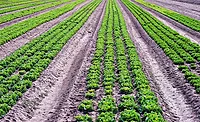California LGMA’s “Romaine Test and Learn” Will Collect Members’ Pathogen Testing Data to Improve Microbial Food Safety Knowledge

Image provided by California LGMA
The California Leafy Greens Marketing Agreement (LGMA) has announced its Romaine Test and Learn initiative, a two-year food safety study commencing in October 2023. Approved unanimously by the LGMA Advisory Board, the study involves collecting and analyzing LGMA members’ pathogen test data for romaine lettuce including both preharvest and postharvest testing.
Romaine Test and Learn will leverage LGMA members’ individual testing data to elicit meaningful, aggregated information to better understand potential microbial risks to leafy greens food safety. The first of its kind in the fresh produce industry, Romaine Test and Learn was inspired by the Aviation Safety Information Analysis and Sharing program used to revolutionize commercial aviation through aggregation and sharing of safety data.
Although testing is not mandatory for LGMA members, it is estimated that over 90 percent of LGMA members conduct romaine lettuce pathogen testing. Romaine Test and Learn will collect and analyze all member testing data over the next two years. Firms that do conduct pathogen testing will be required to meet certain protocols for collecting and testing samples. The requirements are as follows:
- Sampling timeline: ≤ 10 days for preharvest pathogen testing and ≤ 24 hours for postharvest pathogen testing
- Sampling lot size: ≤ 10 acres for preharvest pathogen testing and defined product lot (field pack versus processed) for postharvest pathogen testing
- Test organisms: Shiga toxin-producing Escherichia coli (STEC)/enterohemorrhagic E. coli (EHEC), E. coli O157:H7, and Salmonella
- Sampling methods: Randomized sampling within a designated lot.
California LGMA has partnered with Western Growers to use their GreenLink™ data sharing and data analytics platform for Romaine and Learn. LGMA members will anonymously input testing data—including sample size, sample date, sample stage, sampling region, commodity description, organisms tested, test result, and organism type—into the Greenlink™ database.
Collected data will be analyzed for potential key learnings by industry and third-party scientists. Below are several potential ways in which the data may be analyzed:
- Frequency of pathogen detection per region
- Differences in pathogen positivity rate depending on where and when a sample is collected
- Whether test results support the risk profile associated with leafy greens
- Whether data indicates a need to make changes to current LGMA food safety standards/metrics.
Data collection for Romaine Test and Learn will span October 2023–October 2025, and LGMA members will be required to share data quarterly, which will be verified by LGMA audits.
Looking for quick answers on food safety topics?
Try Ask FSM, our new smart AI search tool.
Ask FSM →








